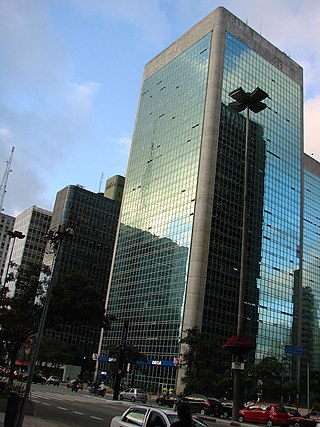
Brazil is divided into several types and levels of subdivisions.
This gallery of coats of arms of Brazilian regions shows the coats of the 26 Brazilian States and the Federal District.

The Regional Federal Courts are the courts of appeal in the Federal Courts of Brazil, the second instance courts of the Brazilian federal justice system, responsible not only for appeals of trial court decisions, but also for writs of security, habeas corpus, and habeas data against acts by federal judges, motions to set aside judgments, criminal revisions, and conflicts of jurisdiction.
The Brazilian municipal elections of 2012 took place on October 7 and on October 28. Over 138 million voters chose mayors, deputy mayors and city councillors for the 5,568 municipalities of Brazil. These were the first elections in which the recently registered parties Partido Pátria Livre (PPL) and Partido Social Democrático (PSD) participated; they were both recognized by the Superior Electoral Court in 2011. Political parties whose candidates wished to run for the 2012 elections had to be registered at the TSE for at least one year before the election date, while candidates also had to be affiliated to a party for the same period of time. Conventions for the selection of candidates within the parties occurred between 10 and 30 June, while the registry of candidates and alliances with the Regional Electoral Courts took place until July 5. Electoral campaign was authorized from the moment a candidacy had been registered. The free electoral program – two daily slots on free-to-air TV and radio for political advertising paid by the Electoral Justice fund – ran weekdays from 21 August until 4 October. According to the current Brazilian electoral law, the two-round system – should the leading candidate receive less than 50% +1 of the votes – is only available for cities with more than 200,000 voters. This includes all state capitals, with the exception of Boa Vista, Roraima and Palmas, Tocantins, plus 59 other municipalities. The free electoral program for the second round ran from 13 October until 26 October.

Events from the year 2008 in Brazil.

Events from the year 2004 in Brazil.

Events in the year 2005 in Brazil.

Events in the year 2009 in Brazil.

Events in the year 2001 in Brazil.

Events in the year 1996 in Brazil.

Events in the year 2000 in Brazil.

Events in the year 1994 in Brazil.

Events in the year 1997 in Brazil.

Events in the year 1998 in Brazil.
Gubernatorial elections were held in Brazil on 5 October 2014 alongside nationwide general elections, with runoff elections held in several states on 26 October.
The Miss Brazil World 1996 pageant took place on October 11, 1996. Each state and the Federal District competed for the title of the Brazilian Crown for Miss World. The winner entered Miss World 1996. Anuska Prado of Espírito Santo ended being the winner at the end of the contest.
The 2010 Brazilian general election saw Dilma Rousseff of the Workers' Party (PT) elected president.

Miss Brazil 2009 was the 55th edition of the Miss Brazil pageant. It was held on 9 May 2009 at the Latin American Memorial Complex in São Paulo, São Paulo State, Brazil and was hosted by Nayla Micherif and Renata Fan. Natálya Anderle of Rio Grande do Sul crowned her successor Larissa Costa of Rio Grande do Norte at the end of the event. Costa represented Brazil at the Miss Universe 2009 pageant. 1st Runner-Up, Rayanne Morais of Minas Gerais represented the country at Miss International 2009.
Miss Brazil 1999 was the 45th edition of the Miss Brazil pageant. It was held on 8 April 1999 at Scala Rio in Rio de Janeiro, Rio de Janeiro State, Brazil and was hosted by Deise Nunes. Michella Marchi of Mato Grosso do Sul crowned her successor Renata Fan of Rio Grande do Sul at the end of the event. Fan represented Brazil at the Miss Universe 1999 pageant. 1st Runner-Up, Paula Carvalho of Rio de Janeiro, represented Brazil at Miss World 1999 and 2nd Runner-Up, Alessandra Nascimento of Minas Gerais, represented the country at Miss International 1999.



